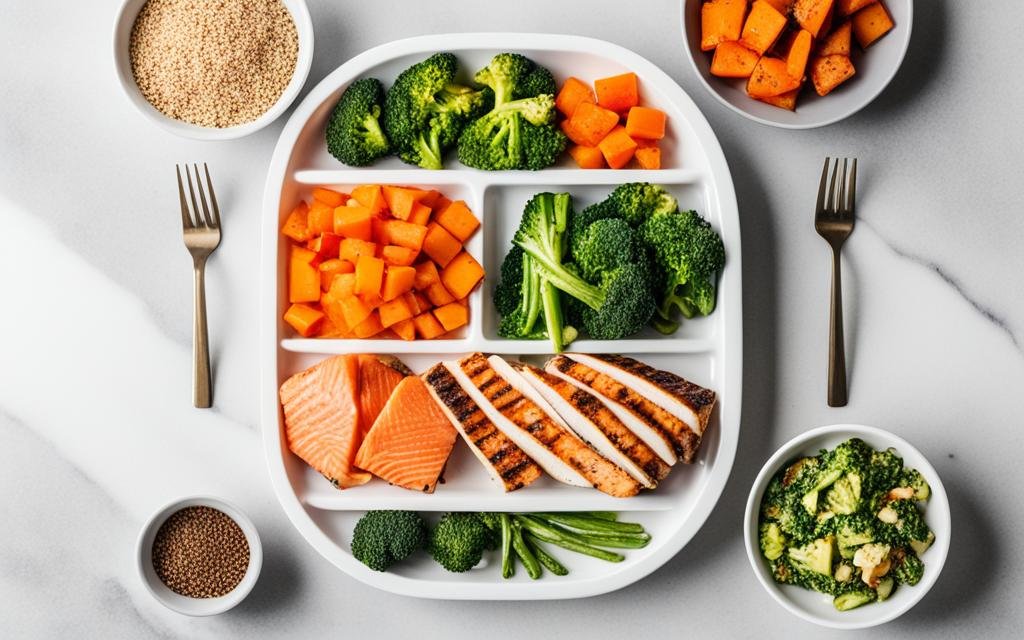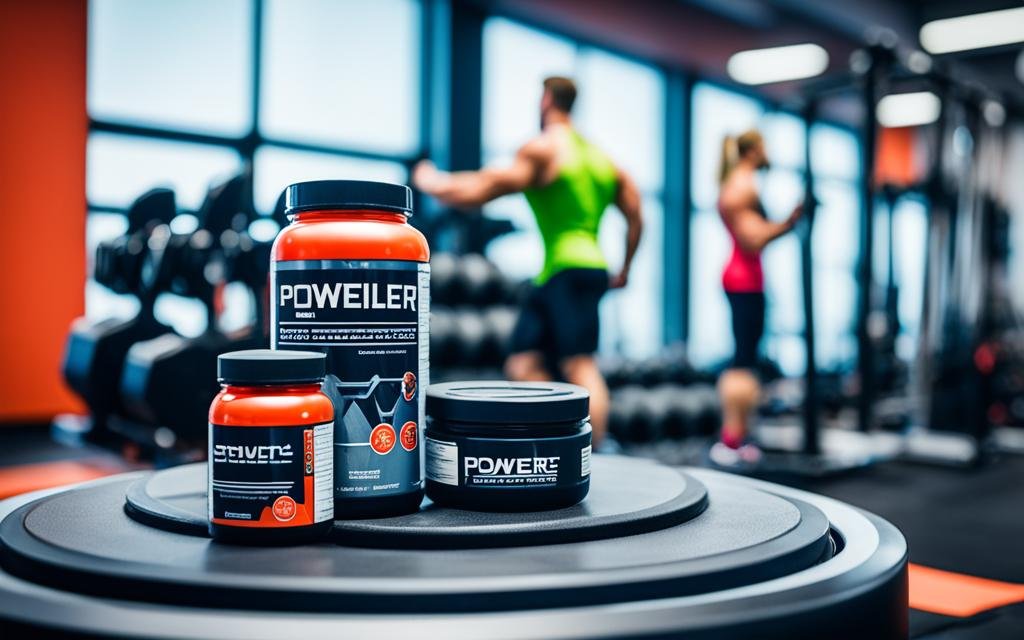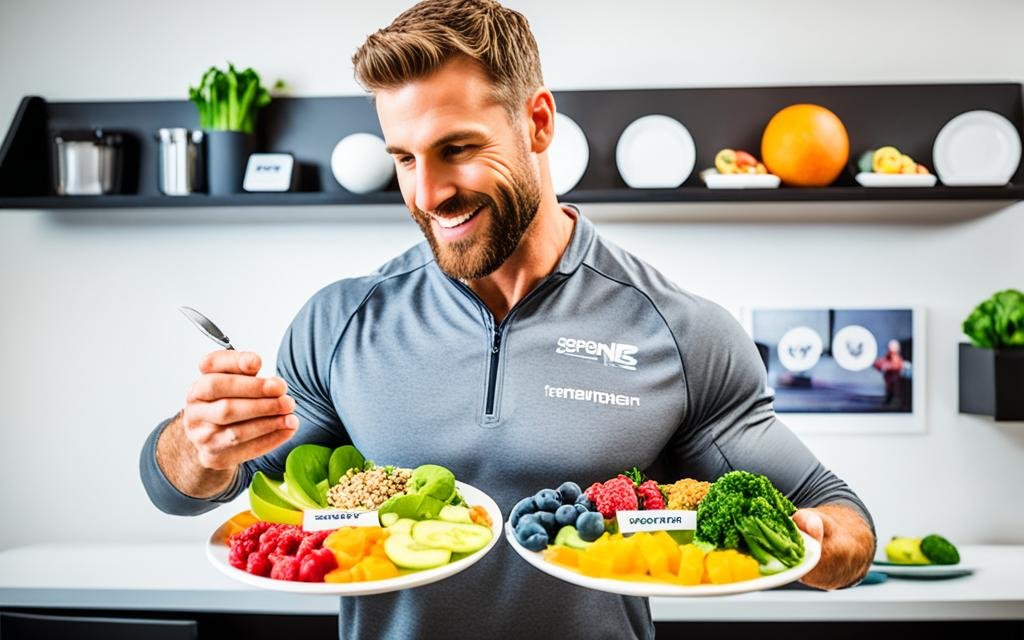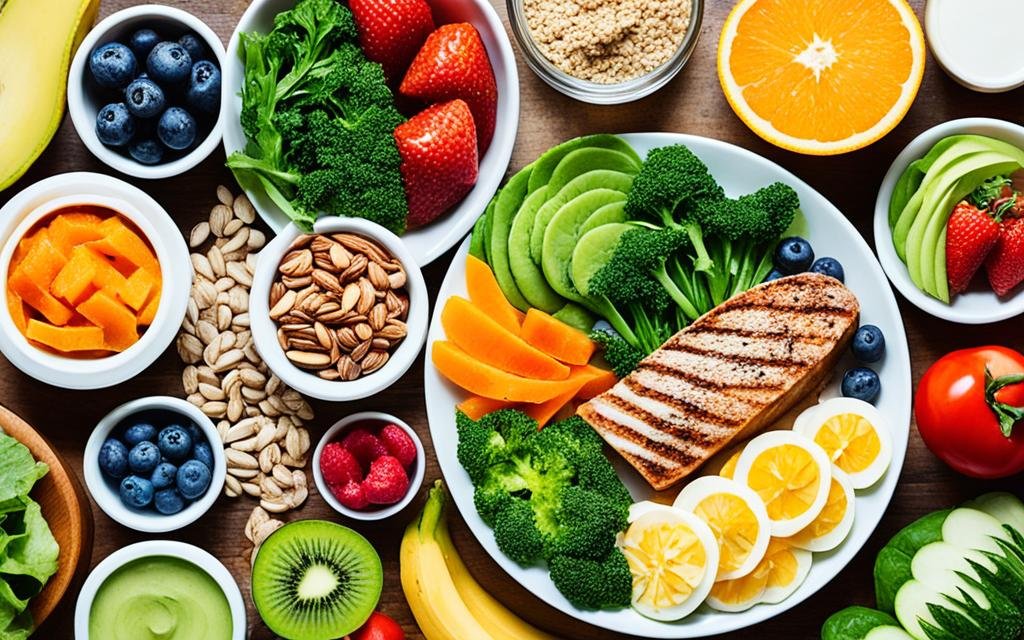In the world of sports, nutrition plays a crucial role in an athlete’s performance and overall wellbeing. Proper sports nutrition and diet can provide the fuel and nourishment needed to maximize athletic potential and support optimal recovery.
Creating an effective sports nutrition strategy involves understanding the unique needs of athletes, designing a well-balanced athlete meal plan, and incorporating the right nutrients to enhance sports performance. In this article, we will explore the concept of the Power Plate and how it can help athletes achieve their nutritional goals.
Key Takeaways:
- Sports nutrition and diet are essential in maximizing athletic performance and recovery.
- An athlete meal plan should be well-balanced and tailored to individual needs.
- High protein diet for athletes can support muscle building and repair.
- Sports performance nutrition is crucial for achieving peak potential.
The Foundation of Sports Nutrition and Diet
In order to optimize athletic performance, it’s crucial to establish a strong foundation of sports nutrition and diet. By understanding the key components of optimal nutrition, athletes can fuel their bodies effectively and reach their full potential. This section will explore the fundamental aspects of sports nutrition and diet, including macronutrients, mindful eating, portion control, and hydration strategies.
Understanding Macronutrients: Carbs, Fats, and Proteins
The three macronutrients, carbohydrates, fats, and proteins, play a vital role in powering athletic performance. Carbohydrates are the primary source of energy for the body, providing fuel for high-intensity activities. Incorporating complex carbohydrates, such as whole grains and starchy vegetables, into the diet can sustain energy levels during training and competition.
Fats are a concentrated source of energy and are crucial for cell function and hormone production. Healthy fats, like those found in avocados, nuts, and olive oil, support overall health and aid in nutrient absorption.
Proteins are essential for muscle repair and growth. They help to optimize recovery after exercise and support the overall development of lean muscle mass. Athletes should include lean sources of protein, such as poultry, fish, and legumes, in their diet to meet their protein needs.
Eating Mindfully: The Role of Meal Timing and Portions
Mindful eating involves paying attention to hunger and fullness cues, making conscious food choices, and eating with intention. Meal timing and portion control are important considerations when developing an effective sports nutrition plan.
Athletes should aim to eat a balanced meal or snack containing carbohydrates, proteins, and fats approximately 2-3 hours before exercise to fuel their bodies adequately. Consuming smaller, easily digestible snacks, such as a banana or a handful of nuts, 30-60 minutes before a workout can provide an additional energy boost.
Portion control is key to maintaining energy balance and preventing overeating. Athletes should listen to their bodies and eat until they feel satisfied rather than uncomfortably full. By practicing mindful eating and monitoring portion sizes, athletes can optimize nutrient intake and support their athletic performance.
Hydration: Choosing Beverages for Optimal Performance
Staying properly hydrated is essential for optimal athletic performance. Dehydration can lead to decreased energy levels, muscle cramps, and impaired cognitive function. Athletes should prioritize hydration before, during, and after exercise.
Water is the best choice for most athletes, as it is readily available and does not contain added sugars or calories. However, during intense or prolonged exercise, especially in hot and humid conditions, athletes may benefit from sports drinks that contain electrolytes to replace those lost through sweat.
It is important to establish a hydration plan based on individual needs and activity levels. Monitoring urine color, body weight before and after exercise, and thirst cues can help athletes determine their fluid requirements and ensure they are adequately hydrated for optimal performance.
| Macronutrient | Primary Functions | Food Sources |
|---|---|---|
| Carbohydrates | Primary source of energy for the body | Whole grains, fruits, vegetables |
| Fats | Provide energy, support cell function, aid in hormone production | Avocados, nuts, olive oil |
| Proteins | Aid in muscle repair and growth | Poultry, fish, legumes |
Maximizing Athletic Performance Nutrition
In order to maximize athletic performance, it is crucial to fuel your body with optimal nutrition. This section will delve into key strategies for enhancing energy levels, promoting recovery, and achieving peak potential as an athlete.
One important aspect of athletic performance nutrition is nutrient timing. By consuming the right nutrients at the right times, athletes can optimize their fueling and enhance their performance. Pre- and post-workout nutrition play a vital role in this regard.
Prior to a workout or competition, it is essential to provide your body with the necessary fuel to perform at your best. This can include consuming a combination of carbohydrates and proteins to provide energy and support muscle function.
By implementing these performance nutrition strategies, athletes can achieve their peak potential.
Post-workout nutrition is equally important for recovery and muscle repair. Consuming a combination of carbohydrates and proteins within the optimal post-workout window can help replenish glycogen stores, reduce muscle soreness, and support muscle growth.
In addition to nutrient timing, there are several other strategies that can enhance athletic performance. These include:
- Optimizing hydration: Proper hydration is essential for maintaining performance and preventing dehydration. Athletes should aim to drink adequate water throughout the day and replenish fluids lost during exercise.
- Balancing macronutrients: A well-rounded diet that includes a balanced intake of carbohydrates, proteins, and fats is essential for providing the necessary energy and nutrients for optimal performance.
- Including micronutrients: Vitamins and minerals play a crucial role in supporting overall health and performance. Athletes should aim to consume a variety of fruits, vegetables, and whole grains to ensure an adequate intake of these micronutrients.
- Considering supplementation: In some cases, athletes may benefit from additional supplementation to meet their specific nutrient needs. However, it is important to consult with a sports nutrition professional before incorporating any supplements into your routine.
By implementing these performance nutrition strategies, athletes can optimize their nutrition and fuel their performance and recovery. The next section will explore how to create a fitness diet plan specifically tailored to the needs of athletes.
| Strategy | Benefits |
|---|---|
| Nutrient Timing | Enhances performance and supports recovery |
| Optimizing Hydration | Maintains performance and prevents dehydration |
| Balancing Macronutrients | Provides energy and essential nutrients for optimal performance |
| Including Micronutrients | Supports overall health and performance |
| Considering Supplementation | Meets specific nutrient needs (with professional guidance) |
Creating a Fitness Diet Plan for Athletes
To optimize performance and support muscle growth and recovery, athletes need a well-designed fitness diet plan. This section will provide guidance on creating a diet plan specifically tailored to the needs of athletes. By incorporating the right balance of nutrients, athletes can fuel their intense training sessions, build muscle, and ensure optimal vitamin and mineral intake for overall health.
Grains and Starchy Veggies: Fueling Intense Training
Athletes engaging in intense training sessions require ample energy to perform at their best. This is where grains and starchy vegetables come into play. These carbohydrate-rich foods provide the fuel needed for prolonged physical activity and help replenish glycogen stores in the muscles. Incorporating whole grains, such as quinoa, brown rice, and whole wheat bread, can provide sustained energy throughout workouts. Starchy vegetables like sweet potatoes, corn, and peas are also excellent sources of carbohydrates that can support intense training sessions.
Lean Proteins: Building Muscle and Recovery
Protein is essential for muscle building, repair, and recovery. Athletes should prioritize including lean sources of protein in their diet plan to support optimal performance. Foods like skinless chicken breast, turkey, fish, lean beef, eggs, and plant-based options like tofu and lentils are excellent sources of high-quality protein. Including protein in every meal and snack can help athletes meet their daily protein requirements and promote muscle growth and repair.
Fruits and Veggies: The Importance of Vitamins and Minerals
Fruits and vegetables play a crucial role in every athlete’s diet plan as they provide essential vitamins, minerals, and antioxidants. These nutrients are important for overall health, immune function, and recovery from training. Including a variety of fruits and vegetables in different colors can ensure a wide range of nutrients. Berries, citrus fruits, leafy greens, broccoli, bell peppers, and tomatoes are all excellent choices. Athletes should aim for a colorful plate to maximize their nutrient intake and support their athletic performance.

| Nutrients | Food Sources |
|---|---|
| Carbohydrates | Whole grains (quinoa, brown rice, whole wheat bread), starchy vegetables (sweet potatoes, corn, peas) |
| Proteins | Skinless chicken breast, turkey, fish, lean beef, eggs, tofu, lentils |
| Vitamins and Minerals | Assorted fruits (berries, citrus fruits), leafy greens, broccoli, bell peppers, tomatoes |
Enhancing Exercise with Optimal Nutrition for Athletes
Optimal nutrition plays a crucial role in enhancing exercise performance for athletes. By fueling their bodies with the right nutrients, athletes can improve their energy levels, prevent fatigue, and achieve their fitness goals. In this section, we will explore the importance of pre-workout fueling, post-workout recovery, and strategies for maintaining energy levels during exercise.
Pre-Workout Fueling: Preparing your body with the right nutrition before a workout is essential for optimal performance. Consuming a balanced meal or snack that includes carbohydrates, proteins, and healthy fats can provide the necessary fuel and nutrients for sustained energy during exercise. It is important to choose foods that are easily digestible and avoid heavy meals that may cause discomfort during physical activity.
Post-Workout Recovery: After a strenuous workout, proper nutrition is essential for the body’s recovery and muscle repair. Consuming a combination of carbohydrates and protein within 30 minutes to an hour after exercise can help replenish glycogen stores and facilitate muscle recovery. Including foods such as lean meats, whole grains, fruits, and vegetables can provide the necessary nutrients for optimal recovery.
Maintaining Energy Levels: During prolonged exercise sessions, it is crucial to maintain energy levels to avoid fatigue and sustain performance. Consuming easily digestible carbohydrates, such as sports drinks or energy gels, can provide a quick source of energy to keep you going. Additionally, staying hydrated by drinking water or electrolyte-rich beverages can prevent dehydration and maintain optimal performance.
Implementing these strategies for optimal nutrition can significantly enhance exercise performance for athletes. By fueling their bodies with the right nutrients before and after workouts and maintaining energy levels during exercise, athletes can optimize their performance and achieve their fitness goals.
Supplements for Athletes: When and What to Consider
In the world of sports performance nutrition, supplements play a significant role in optimizing an athlete’s diet. Understanding the different types of dietary supplements available and knowing when and how to incorporate them can be crucial in enhancing athletic performance and overall well-being.
Understanding Dietary Supplements
Dietary supplements are products that contain one or more essential nutrients, such as vitamins, minerals, proteins, or probiotics. These supplements are intended to supplement an athlete’s regular diet and provide additional nutrients that may be lacking due to strenuous physical activity, training, or specific dietary preferences.
When considering dietary supplements, it is essential to choose reputable brands that have undergone rigorous testing and are certified by regulatory bodies such as the U.S. Food and Drug Administration (FDA). Additionally, consulting with a sports nutritionist or healthcare professional can help determine the specific needs and appropriate dosages for individual athletes.
Probiotics and Protein Powders
Probiotics are beneficial bacteria strains that support healthy digestion and immune function. They can help athletes maintain a healthy gut flora, improve nutrient absorption, and reduce the risk of gastrointestinal issues during intense physical activity. Probiotics can be found in various forms, including capsules, powders, and fermented foods.
Protein powders, on the other hand, are a convenient way to supplement an athlete’s protein intake. They can be particularly beneficial for athletes who struggle to consume enough protein from whole food sources alone. Protein powders are available in different forms, including whey, casein, and plant-based options such as pea, soy, or rice protein.
Assessing the Need for Electrolytes and Energy Supplements
Electrolytes, such as sodium, potassium, and magnesium, play a vital role in maintaining hydration and muscle function. Athletes who engage in prolonged or intense physical activity, especially in hot weather conditions, may need to replenish electrolytes to prevent dehydration and muscle cramps. Electrolyte supplements are available in powder, tablet, or liquid forms.
Energy supplements, such as carbohydrates or caffeine-based products, can provide an extra boost during high-intensity workouts or competition. Carbohydrate-based energy gels or drinks can rapidly replenish glycogen stores and provide a quick source of fuel. Caffeine supplements, when used in moderation and under the guidance of a sports nutritionist, may enhance endurance, focus, and performance.
Supplements for Athletes: When and What to Consider
In the world of sports performance nutrition, supplements play a significant role in optimizing an athlete’s diet. Understanding the different types of dietary supplements available and knowing when and how to incorporate them can be crucial in enhancing athletic performance and overall well-being.
| Supplement | Benefits |
|---|---|
| Probiotics | Supports healthy digestion and immune function |
| Protein Powders | Convenient way to supplement protein intake |
| Electrolytes | Maintains hydration and muscle function |
| Energy Supplements | Provides extra fuel and performance enhancement |
When considering dietary supplements, it is essential to choose reputable brands that have undergone rigorous testing and are certified by regulatory bodies such as the U.S. Food and Drug Administration (FDA). Additionally, consulting with a sports nutritionist or healthcare professional can help determine the specific needs and appropriate dosages for individual athletes.
By understanding the benefits and considerations of different supplements, athletes can make informed decisions regarding their supplementation strategy and optimize their nutrition for peak performance.

Exploring Sports Nutritionist Services and Consultations
In today’s highly competitive sports landscape, where athletes are constantly pushing their limits, proper nutrition plays a crucial role in achieving optimal performance. As an athlete, you may have heard about sports nutritionist services and consultations. But what exactly do they entail, and how can they benefit you? In this section, we will delve into the world of sports nutritionists and sports dietitians, who can provide you with personalized meal planning and nutritional guidance tailored to your specific athletic needs.
When it comes to achieving your performance goals, a sports nutritionist or sports dietitian can be your best ally. These professionals have in-depth knowledge of sports nutrition and are equipped with the expertise to create customized meal plans that align with your individual training demands and performance objectives.
Working with a sports nutritionist or sports dietitian offers several advantages. Firstly, they can help you optimize your nutrition by designing a meal plan that provides the right balance of macronutrients – carbohydrates, fats, and proteins – for sustained energy, muscle repair, and recovery. Additionally, they can guide you in making smart food choices that enhance both your athletic performance and overall health.
One of the key benefits of sports nutritionist services is the personalized approach they offer. These professionals take into consideration your unique physiological needs, training schedule, and dietary preferences to create a meal plan that is tailored specifically for you. This level of customization ensures that you are getting the nutrients you need to excel in your sport while also enjoying the foods you love.
Moreover, sports nutritionists can provide valuable guidance on supplements, hydration strategies, and healthy eating habits. They stay updated on the latest research and trends in sports nutrition, enabling them to provide evidence-based recommendations that align with your athletic goals.
By working with a sports nutritionist or sports dietitian, you are not only investing in your performance but also in your long-term health and well-being. These professionals can help you develop a sustainable, balanced approach to nutrition that supports your athletic endeavors and promotes overall health.
So, if you are serious about taking your athletic performance to the next level, consider exploring sports nutritionist services and consultations. By partnering with a sports nutritionist or sports dietitian, you can optimize your nutrition, fuel your body for success, and ultimately achieve your performance goals.

Crafting Athletic Meal Plans with a Sports Dietitian
In order to optimize their nutrition and fuel their performance, athletes can benefit from working with a sports dietitian to craft personalized meal plans. A sports dietitian has the expertise to identify an athlete’s individual energy and nutrient needs, taking into account their training intensity, goals, and specific dietary requirements. By collaborating with a sports dietitian, athletes can develop a comprehensive meal plan that supports their training and competition needs.
Identifying Individual Energy and Nutrient Needs
One of the key roles of a sports dietitian is to assess an athlete’s energy and nutrient needs. Through a thorough evaluation of their activity level, body composition, and specific sport requirements, the sports dietitian can determine the optimal caloric intake and macronutrient distribution for the athlete. This individualized approach ensures that athletes receive the right amount of carbohydrates, fats, and proteins to support their energy levels, muscle recovery, and overall performance.
Custom Meal Planning for Training and Competition
Based on the athlete’s specific energy and nutrient needs, a sports dietitian can then develop a custom meal plan that aligns with their training and competition schedule. This meal plan will outline the timing and composition of meals for optimal fueling and recovery. It will take into account pre-workout nutrition, post-workout refueling, and the distribution of meals and snacks throughout the day. Custom meal planning ensures that athletes have the necessary nutrients readily available to support their physical demands and optimize performance.
Recognizing Food Sensitivities and Allergies
In addition to personalized energy and nutrient needs, a sports dietitian can also help athletes identify and address any food sensitivities or allergies. By conducting tests or carefully assessing an athlete’s dietary history, the dietitian can determine if there are any foods that may be negatively impacting their performance or overall well-being. With this insight, the sports dietitian can make appropriate modifications to the athlete’s meal plan, ensuring that it is both nutritionally balanced and compatible with their individual needs.
Working with a sports dietitian for athletic meal planning provides athletes with the guidance and expertise to optimize their nutrition and fuel their performance. By identifying individual energy and nutrient needs, customizing meal plans, and addressing food sensitivities or allergies, athletes can enhance their physical capabilities and achieve their performance goals.

Healthy Eating Strategies for Athletes
In order to optimize performance and maintain a high level of energy, athletes must prioritize healthy eating strategies. Consuming a balanced diet that is rich in whole foods is crucial for fueling the body and supporting optimal nutrition. Here are some key strategies that athletes should consider:
- Incorporate Nutrient-Dense Meals and Snacks: Athletes should aim to include a variety of nutrient-dense foods in their diet. This includes foods that are rich in vitamins, minerals, and antioxidants, such as fruits, vegetables, whole grains, lean proteins, and healthy fats. These foods provide essential nutrients and promote overall health and wellbeing.
- Emphasize Variety and Moderation: It’s important for athletes to consume a wide range of foods to ensure they are getting a diverse array of nutrients. By incorporating different food groups and flavors into their meals, athletes can enjoy a varied diet while meeting their nutritional needs. Moderation is also key, as athletes should watch portion sizes and listen to their body’s hunger and fullness cues.
By following these healthy eating strategies, athletes can fuel their bodies with the necessary nutrients for optimal performance and recovery. Remember, nutrition plays a vital role in athletic success, so it’s important to prioritize a balanced and nourishing diet.
Choosing the Best Sports Supplements for Performance
In order to enhance athletic performance, athletes often turn to sports supplements to provide them with an extra edge. However, not all supplements are created equal, and it is important to choose the best options that align with your specific needs and goals. In this section, we will guide you through the process of selecting the most effective sports supplements for optimizing your performance.
Analyzing the Effectiveness of Performance-Enhancing Supplements
When considering sports supplements, it is crucial to analyze their effectiveness and whether they are backed by solid scientific evidence. Look for supplements that have undergone rigorous testing and research, demonstrating their ability to enhance athletic performance. Consult reputable sources, such as scientific journals and reputable sports nutrition organizations, for reliable information on the effectiveness of different supplements.
Legal and Health Considerations When Selecting Supplements
While sports supplements can provide benefits, it is essential to consider the legal and health aspects when selecting them. Ensure that the supplements you choose comply with the regulations of your athletic organization to avoid any potential violations. Additionally, prioritize your health by thoroughly researching the potential side effects and interactions of the supplements with any medications or existing health conditions you may have. Consult with a sports nutritionist or healthcare professional for personalized guidance.
| Supplement | Description | Benefits |
|---|---|---|
| Protein Powder | A powdered form of protein derived from sources such as whey, casein, or plant-based proteins. | – Supports muscle repair and growth – Enhances post-workout recovery – Convenient source of protein for athletes with high protein needs |
| Creatine | A naturally occurring compound that helps provide energy for short-duration, high-intensity activities. | – Increases strength and power output – Improves muscle endurance – Aids in muscle recovery |
| Omega-3 Fatty Acids | Essential fatty acids found in foods like fish, flaxseeds, and walnuts. | – Reduces inflammation – Supports cardiovascular health – Enhances joint health and mobility |
Remember, sports supplements should complement a well-rounded diet and training regimen, not replace them. It is essential to prioritize the fundamentals of sports nutrition and diet first before incorporating supplements into your routine. Always consult with a qualified professional to ensure that the supplements you choose are safe, effective, and aligned with your individual needs and goals.
Pre and Post Workout Nutrition
In the world of sports nutrition and diet, pre and post workout nutrition plays a vital role in optimizing an athlete’s performance and recovery. Fueling the body with the right nutrients before and after exercise can make a significant impact on energy levels, muscle repair, and overall athletic performance.
When it comes to pre-workout nutrition, the goal is to provide the body with sustained energy to power through the training or competition. Consuming a balanced meal or snack that combines carbohydrates, protein, and a moderate amount of healthy fats can help meet the energy demands of exercise.
Carbohydrates are the primary source of fuel for the muscles during exercise. Including complex carbohydrates, such as whole grains, fruits, and vegetables, in the pre-workout meal can provide a steady release of energy throughout the training session.
Protein is essential for muscle repair and recovery. Incorporating a high-quality protein source, such as lean meats, poultry, fish, dairy products, or plant-based protein options, can help support muscle growth and repair during exercise.
Healthy fats, found in foods like avocados, nuts, and seeds, can provide a slower release of energy and help sustain performance during longer duration workouts. However, it’s important to consume these in moderation, as too much fat can lead to digestive discomfort during exercise.
In addition to the macronutrients, it’s crucial to stay hydrated by drinking water or electrolyte-rich beverages before and during exercise. Proper hydration is essential for maintaining optimal performance and preventing dehydration.
After a workout, the body needs nutrients to kick-start the recovery process. Post-workout nutrition should focus on replenishing glycogen stores, repairing muscle tissue, and aiding in recovery.
Consuming a combination of carbohydrates and protein within the first hour after exercise is crucial. Carbohydrates help replenish the depleted glycogen stores, while protein supports muscle repair and growth.
An ideal post-workout meal or snack could include sources of fast-digesting carbohydrates, such as fruits or sports drinks, to quickly replenish glycogen levels. Pairing this with a high-quality protein source, such as lean meats, eggs, or whey protein, can aid in muscle repair and recovery.
Timing is essential when it comes to post-workout nutrition. Aim to consume a post-workout meal or snack within 30 to 60 minutes after exercise to take advantage of the body’s heightened sensitivity to nutrient uptake.
It’s important to remember that individual nutrient needs may vary based on factors such as training intensity, duration, and personal goals. Consulting with a sports nutritionist or dietitian can provide personalized guidance on pre and post workout nutrition to optimize athletic performance.
Conclusion
In conclusion, this article has discussed the importance of building an effective sports nutrition strategy for athletes. By understanding the fundamentals of sports nutrition and diet, athletes can optimize their performance and overall health. The key takeaways from this article include:
- Understanding the role of macronutrients – carbs, fats, and proteins – in fueling athletic performance.
- Eating mindfully by focusing on meal timing, portion control, and hydration to optimize nutrient intake.
- Maximizing athletic performance through optimal nutrition, including pre- and post-workout fueling strategies.
- Creating a custom fitness diet plan that incorporates grains, lean proteins, fruits, and vegetables.
- Enhancing exercise with optimal nutrition, including pre-workout fueling and post-workout recovery.
- Considering the use of supplements under the guidance of a sports nutritionist.
- Exploring sports nutritionist services and consultations for personalized meal planning and guidance.
- Crafting athletic meal plans with a sports dietitian, considering individual energy and nutrient needs.
- Incorporating healthy eating strategies such as consuming a balanced diet rich in whole foods.
- Choosing the best sports supplements, analyzing effectiveness, and considering legal and health considerations.
- Understanding the importance of pre and post workout nutrition for optimal performance and recovery.
By implementing the strategies and recommendations discussed in this article, athletes can optimize their nutrition and fuel their performance and recovery. Remember, optimal nutrition is crucial for supporting athletic performance and achieving peak physical condition.
FAQ
What is the Power Plate and how can it help with sports nutrition?
What are macronutrients and why are they important for athletes?
How does mindful eating, meal timing, and portion control impact sports nutrition?
What should athletes drink to stay properly hydrated during exercise?
How can athletes maximize their athletic performance through nutrition?
What foods should be included in a fitness diet plan for athletes?
How does optimal nutrition enhance exercise for athletes?
What are some recommended dietary supplements for athletes?
How can a sports nutritionist or sports dietitian help athletes?
How can a sports dietitian assist with crafting athletic meal plans?
What are some healthy eating strategies for athletes?
How can athletes choose the best sports supplements for performance?
Why is pre and post-workout nutrition important for athletes?
Source Links
- https://www.ncbi.nlm.nih.gov/pmc/articles/PMC8226869/
- https://www.hprc-online.org/nutrition/performance-nutrition/power-plate-eat-fuel-your-performance
- https://health.mil/News/Gallery/Infographics/2022/06/22/Eat-to-Fuel-your-Performance
